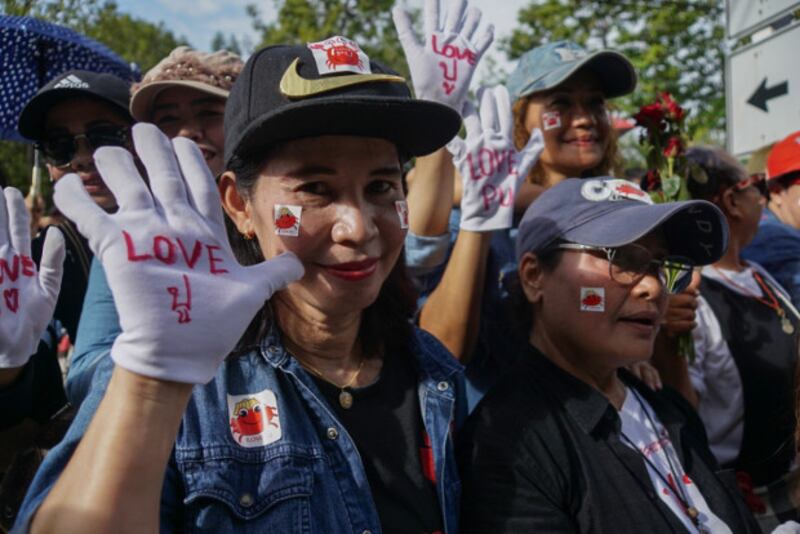Updated at 12:58 p.m. ET on 2017-08-25
Former Prime Minister Yingluck Shinawatra fled Thailand through Cambodia, a source said Friday after she failed to appear in court to hear a verdict in a rice-subsidy scheme that could have sent her to prison for 10 years.
The Supreme Court rescheduled the verdict for Sept. 27 and issued a warrant for Yingluck’s arrest as a top government minister said officials “may have helped her” leave the country.
A source close to an aide of Yingluck told BenarNews that she had traveled through Trat province, about 320 km (200 miles) south of Bangkok, before crossing into Cambodia to board a plane that took her to another country a few days ago.
“Her aide assisted and they went to Cambodia and assisted her flying from there,” said the source who asked not to be identified and declined to name her final destination.
CNN, quoting a highly-placed source in Yingluck’s Pheu Thai party, said she left Thailand on Wednesday and is now “safe and sound” in Dubai, one of the cities where her brother lives.
Former Prime Minister Thaksin Shinawatra has been living in exile for years after a military coup removed him from office in 2006.
Gen. Prawit Wongsuwan, deputy prime minister, told reporters he could not rule out that she fled the country.
“It is not clear, but she was a former premiere, officials may have helped her out,” he told reporters in Bangkok.
Prime Minister Prayuth Chan-o-cha, a former army general who toppled Yingluck’s administration in May 2014, said he had ordered security agencies to track her down.
Asked if Yingluck’s vanishing act would weaken the movement supporting the Shinawatras, he replied: “I don’t know. People are all Thais. Preference is idiosyncratic, but anyone stirring up (trouble) will face justice.”
“This morning I felt glad that Yingluck was a brave woman to face the verdict, but I later heard she had ear fluid problem,” he told journalists after reports surfaced that she ducked her court hearing. “I can only order security agencies to find out if she was really sick or where she is.”
Yingluck’s lawyer told the court that she had Ménière's, which causes vertigo and ringing in the ears, and could not appear for the verdict.
“I received her last contact at 8 a.m. that she had Ménière's disease. I don’t know where she is,” lawyer Norawit Lalaeng said.
“The court does not believe the defendant was sick enough to not be able to appear. Based on her behavior, it is believed the defendant intended to escape, therefore an arrest warrant is issued,” Chief Judge Cheep Chulamon said during the hearing.
Before the court issued the arrest warrant, it ordered two of Yingluck’s former commerce ministers to serve prison terms for their roles in the rice scheme. Boonsong Teriyapirom and Poom Saraphol were sentenced to 42 and 36 years in prison, respectively, for falsifying deals with China in 2013.
Yingluck has not been charged with corruption, but a conviction for negligence in the bungled scheme carries up to 10 years in prison and a life ban from politics.
About half an hour before the court’s hearing started, a heavily tinted van previously used by Yingluck inched through thousands of supporters before turning away at the court’s entrance.
“I don’t believe that Yingluck fled because she was guilty. She helped people, she did not kill people,” supporter Sombat Tubpom, 66, told BenarNews.

Supporters display their "love gesture" to former Thai Prime Minister Yingluck Shinawatra, in Bangkok, Aug. 25, 2017. [Pimuk Rakkanam/Benar News]
Troubled rice-pledging scheme
Yingluck, 50, made history in 2011 when she became the nation’s first female leader on a wave of popular support. The criminal charges stemmed from her administration’s scheme to buy entire rice crops at prices well above the market rate.
In a bid to influence the world rice market, she encouraged rice farmers to store their crops in government silos and gave advance payments of 15,000 baht (U.S. $450) per ton. At the time, rice sold for 9,000 baht ($270) per ton.
The program, riddled with graft, failed as the global rice market tanked. Officials appraised the loss at 178 billion baht ($5.3 billion), from 2012 to 2014, when the government was left with warehouses full of overpriced crop that eventually rotted in silos.
Yingluck’s popularity grew among the nation’s 23 million farmers, a group representing more than half of the nation’s voting population. But worldwide prices never reached the advance price.
In May 2014, Yingluck’s term as prime minister abruptly ended when the constitutional court forced her to step down after finding her guilty of abusing power. During the same month, members of the Royal Thai Armed Forces launched a coup d’etat, the 12th since the end of absolute monarchy in 1932.
In September 2016, the Comptroller General ordered Yingluck to repay 35.7 billion baht ($1 billion) from a civil case related to the rice scheme. Last month, authorities froze 12 of her bank accounts.
Yingluck, whose net worth is about U.S. $17 million (565 million baht), said the case against her is politically motivated. In court earlier this month, she proclaimed her innocence and begged the judges to not let politics or Thailand’s junta sway their ruling.
“I did not do anything wrong,” Yingluck told the court. “As an upcountry woman who saw farmers – the backbone of the nation – living in horrible conditions, I tried to help them out.”
Political observers said Yingluck’s self-exile with brother Thaksin would not lead to the demise of the Shinawatra political dynasty.
“If Yingluck really escaped, the government has lifted off political pressure, but the pro-Shinawatra Red Shirt movement still has potential successors,” retired Lt. Gen. Nanthadej Meksawat told BenarNews.
This updated version includes a CNN report that she is now in Dubai.
